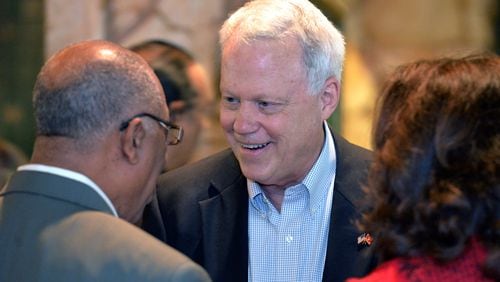With a new Congress taking office last week, former U.S. Rep. Paul Broun left Washington without having to answer charges that he misused taxpayer money to assist his failed Senate bid.
Congressional investigators in October issued a report that found substantial evidence that Broun used his Congressional taxpayer-funded account to hire an outside political consultant in violation of House rules and federal laws prohibiting taxpayer spending for political purposes. The Office of Congressional Ethics board voted unanimously to recommend further investigation by the House Ethics Committee, which could have sanctioned Broun and ordered him to repay the funds alleged to have been misused.
But with the new Congress in place and Broun back in Georgia searching for his next job, the House’s jurisdiction has expired because the Athens Republican is no longer in office. The Justice Department could still pursue the case as a criminal matter.
Broun, a Republican elected to the House in 2007, still maintains he did nothing wrong and hopes the unresolved ethics case will not tarnish his legacy in Congress.
“Everything I did was completely moral, ethical and legal,” Broun said in an interview last week. “If it had been taken to it’s full course I would have been exonerated.”
The Office of Congressional Ethics report released in October found evidence that contradicts Broun’s claims. House members are prohibited from using their congressional office funds for political purposes or to hire outside consultants. The report detailed how Broun paid $43,750 in taxpayer funds to GOP consultant and debate coach Brett O’Donnell over a nearly two-year period beginning in June 2012.
Some payments to O’Donnell took place as Broun’s Senate campaign struggled to raise money. Broun may have turned to the taxpayer funds to enlist O’Donnell’s services because his campaign could not afford him, the report found.
A staunch conservative, who remains critical of irresponsible spending in Washington, Broun said he plans to continue to fight for conservative principles. He said he is weighing several options for his post-Congressional life, but would not provide additional details.
He said people have encouraged him to run again for the U.S. Senate or House or even consider running for state office in Georgia. Broun says he is not running for office, but he also talks like someone who hasn’t ruled out another run. He was critical of new Sen. David Perdue for supporting Kentucky Republican Mitch McConnell for Senate majority leader. Broun said he recognizes the unresolved ethics case could possibly come up if he ran for office again.
“I’m just moving forward,” he said. “I did not misuse taxpayer funds.”
If he were to pursue state office in the wake of a Congressional ethics probe, it would not be the first time an ex-Congressman from Georgia took that course. Gov. Nathan Deal resigned from Congress in the face of an Office of Congressional Ethics probe into his personal business practices. His resignation ended Congress’s jurisdiction in the case, but questions about the case dogged his gubernatorial campaign.
There was never a criminal investigation into the allegations, but others in Congress have faced criminal inquiries that grew out of ethics investigations. If the Justice Department were to pursue a case against Broun, it wouldn’t be unprecedented.
Former U.S. Rep. Steve Stockman of Texas, who left office this month, disclosed in November that he was subpoenaed by a federal grand jury in a criminal matter. Three of his aides also received subpoenas. The Office of Congressional Ethics in June found substantial evidence that the Texas Republican violated campaign finance laws and House ethics rules.
Congressman Tim Bishop, a Democrat from Long Island, was defeated last fall after facing a federal investigation and a Congressional ethics probe for alleged campaign violations. The federal probe was closed without charges, but the House Ethics Committee took the case up for further review and it remained unresolved when Bishop left office this month.
Good government groups and some House members have cited the recent spate of ethics cases before Congress as they’ve called for ethics reform. Common Cause, a nonprofit that tracks money in politics, wants the Office of Congressional Ethics (OCE) to have subpoena power and a more permanent place in the oversight structure of the body. Currently, the office established in 2008 in the wake of the Jack Abramoff pay-to-play scandal, must be renewed with each new Congress. The office, which is non-partisan, received a two-year renewal in a vote by the House last week.
Since its inception, the office has conducted 137 investigations. In 50 of those cases, investigators found enough evidence to forward the cases onto the House Ethics Committee for further review, as they did with Broun’s case. In each of the 50 cases, the office’s report was made public. In four of those cases the committee took some sort of action against members, but in most they did not, according to the OCE’s data. In about half the cases, the allegations centered around campaign finance violations.
For at least seven members, including Broun, cases were still pending when they left office, either because they were defeated or did not seek re-election. The House rules say the ethics committee loses jurisdiction once a member leaves Congress.
The Senate requires all its members and staff to undergo ethics training. But the House only last week instituted such a requirement, and only for new members. House staff were previously required to have ethics training. Last fall, a bipartisan effort among some reform-minded House members called for regular mandatory training for all members.
More needs to be done, said Aaron Scherb, the director of legislative affairs for Common Cause in Washington. He said the group will continue to push for mandatory annual training for all members. He said when there are ethics breakdowns it chips away at the public’s confidence in Congress and its work.
“Congress sets the laws for the country and the rules we all live by,” he said. “It’s incumbent upon (members of Congress) that they be the most ethical. Otherwise, the public will continue to lose trust in government.”
About the Author








